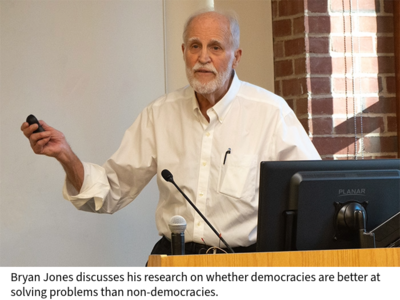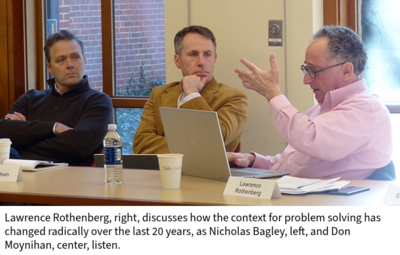Can Government Solve Problems? Yale Gathers Leading Thinkers for Fresh Insights

Among the first 52 words of the U.S. Constitution are a charge for the newly formed federal government to “promote the general Welfare” of its citizens.
Two hundred and thirty-seven years after these words were written, social scientists, researchers, and political actors continue to debate how or — in some instances even if — the government should fulfill that role.
Yale’s Institution for Social and Policy Studies invited leading scholars to campus earlier this month to explore that question and how we should view the U.S. government today as a problem-solving institution.
“This is a great opportunity to forge more of an intellectual community around these questions with some of the most important and exciting scholars in this area,” said Alan Gerber, ISPS director and Sterling Professor of Political Science. “And think about some of the ways we can contribute to a topic of enormous academic and social importance.”
Gerber organized the meeting of political scientists, economists, and legal scholars with Eric Patashnik, Julis-Rabinowitz Professor of Public Policy and professor of political science at Brown University, building on an earlier collaboration on the topic.
The event was sponsored by ISPS’s Democratic Innovations, a program that identifies and tests new ideas for improving the quality of democratic representation and governance. In the spring semester, Democratic Innovations will hold conferences on the place of emotions in a democracy, using political lotteries for government oversight, theoretical political economy, artificial intelligence and governance, and fighting corruption.
The participants in this month’s conference on government and the politics of problem solving prepared issue briefs that ISPS plans to package and share in the spring. They addressed common themes and questions, such as distinguishing problem solving from other government roles, how to measure government performance, what types of research designs can help resolve questions around government performance, the relationship between media attention and problem solving, motivations and incentives for problem solving, and the role of crises in mobilizing resources for problem solving.
Patashnik discussed his research with Gerber on the political forces shaping the production of problem solving in American government. Pointing to problems such as the decades-long failure of schools to use evidence-based methods to teach reading to young children, Patashnik noted that well-documented breakdowns in institutional performance do not automatically generate an appropriate response.
“In a democracy, political incentives must exist for problem solving to occur,” he said. “And such incentives are often missing.”
Bryan Jones, Professor, J. J. “Jake” Pickle Regents Chair in Congressional Studies at the University of Texas at Austin, discussed his research on whether democracies are better at solving problems than non-democracies. He concluded that democracies are better at defining and prioritizing problems and that the centralization of decision-making in more authoritarian governments can hinder problem solving.
“The more diverse the sources of information, the better the information sources are in defining a problem,” Jones said. “Democracies are excellent at putting together institutions that capture this diversity.”
Matt Grossman, director of Michigan State University’s Institute for Public Policy and Social Research, discussed the current political landscape in the United States, featuring skepticism toward both government and experts among conservatives and a pro-system stance among liberals.
“It is not quite as bad as it looks,” Grossman said. “The public is not always on one side or the other in this dispute. They recognize the strengths of Democrats in proposing solutions and of Republicans in limiting government overreach.”
He said experts and academics can be found at all levels of the policy-making system and that scientists are one of the most represented interest groups in Washington, D.C., asking for money like most other interest groups.
“We should be wary about saying no true technocracy has ever been tried,” Grossman said. “Experts have a greater level of knowledge, which should be a great advantage. But experts also have distinct and not necessarily better values — as well as definitely not better interests. Their pronouncements are amalgams of their knowledge, values, and interests. If we want to empower the technocrats, we’re going to have to deal with those downsides.”
Lawrence Rothenberg, Corrigan-Minehan Professor of Political Science and director of the W. Allen Wallis Institute of Political Economy at the University of Rochester, highlighted how the context for problem solving has changed radically over the past 20 years in the face of increased polarization, questioning of traditional norms, the fracturing of media consumption, and the rise of private politics, where efforts to influence corporations occur outside of government action.
“Problem solving is not a static thing,” Rothenberg said, noting how technical advancements such as artificial intelligence present potential disruptions. “The world that we are looking at today is very different, impacting a lot of the problems that we have and the kinds of solutions that are needed.”
Sarah Anzia, a professor of public policy and political science at the University of California, Berkeley, encouraged her colleagues to emphasize the role of power in problem solving.
“Policymakers know when they are solving problems because they are fighting power,” Anzia said, citing examples such as opposition from teachers’ unions to the Obama administration’s education reforms. “They’re pushing back against whatever the existing power structure is.”
When asked about electoral obstacles to enacting policy changes that are widely supported by voters, Anzia said that there is often a lack of consensus on what constitutes a problem and which problems should be prioritized.
“A lot of policy is made without the mass public paying any attention at all — often by state, local, and federal agencies,” she said. “It doesn’t come up in debates during campaigns. These policies are influenced by interest groups with technical expertise, and that can give rise to new problems.”
In addition, she said a change in leadership does not always result in improved problem solving, even if those problems are widely acknowledged.
“Elections often reflect public dissatisfaction with current outcomes,” Anzia said. “But new leaders may not have the expertise to effectively address the problems. And those vested interest groups are still there. They still have the expertise. It’s not as though you just flip a switch.”
David Wilkinson, executive director of Yale’s Tobin Center for Economic Policy and an ISPS faculty fellow, shared experiences from his career, particularly his time at the White House running the Office of Social Innovation under President Barack Obama.
Wilkinson emphasized the importance of building evidence to understand the impact of government programs, noting that the Department of Labor was spending only .25% of its budget on evidence-building when he started. He said the administration increased evidence budgets across major domestic policy agencies, sometimes tripling them.
“We began to home in on that and defined our mission as finding effective solutions, scaling them to benefit more people, and creating a more outcomes-driven government,” Wilkinson said.
But he also underscored significant barriers to these approaches, including political resistance, administrative complexity, and the need for cultural change within government institutions.
“We need to invest in evidence, but we also need to create demand for evidence,” Wilkinson said. “Right now, it is not especially valued.”
Additional presentations and discussions featured David Mayhew, ISPS fellow and Sterling Professor of Political Science, Emeritus; Frances Lee, professor of politics and public affairs at Princeton University; Steven Teles, professor of political science at Johns Hopkins University and a senior fellow at the Niskanen Center; Keith Whittington, David Boies Professor of Law at Yale and an ISPS affiliated faculty member; Dan Carpenter, Allie S. Freed Professor of Government and Chair of the Department of Government at Harvard University; Roberta Romano, Sterling Professor of Law at Yale and co-director of the Yale Law School Center for the Study of Corporate Law; Brandice Canes-Wrone, professor of political science at Stanford and senior fellow at the Hoover Institution; Don Moynihan, professor of public policy at the University of Michigan; and Christina Kinane, ISPS faculty fellow and assistant professor of political science at Yale.
“We had high expectations for this conference, but this exceeded it,” Patashnik said to conclude the gathering. “We aimed to bring together a group of scholars who could create an intellectually stimulating and fresh conversation about the capacity for government to solve problems.”
He said he was struck by how many of the conversations were not only timely but timeless, drawing on arguments that have been percolating in public policy research for many years but not necessarily examined in the current context.
“To me, what always makes a good conversation is when it feels very current, but the issues are also very enduring.”